Discover How To Use The Power of Authority Marketing To Make You Money While You Adventure!
No Experience, Existing Product Or Technical Skills Are Required
DO YOU BELIEVE ADVENTURES ARE WORTH CHASING?
Living or spending a lot of time in your van may be the catalyst for great adventure, but it also comes with its fair share of responsibilities. Whether you're a weekend warrior, a part-time traveller, or a full-time nomad, it's important to align your environmental values with your vanlife vision.
As 21st century global citizens, it's up to all of us to deal with the collective environmental problems faced by the world. Waste is one of the biggest issues we face on the planet, with plastic and other rubbish clogging our oceans and polluting our environment. Recycling alone is not enough, it's time to be pro-active and take responsibility for your own waste.
Positive change always begins at home, whether your home has wheels or not. While vanlife can be challenging when it comes to waste reduction and management, this way of living also helps to put things in perspective. There's nowhere to hide when you're living in a van, with the lack of space and constant movement making you acutely aware of your environmental impact.
It's very hard to remain in denial when you live in a van, with all the waste you generate remaining up-close-and-personal until it's dealt-with by you. There's no rubbish truck, or large rubbish bin for that matter, so you have the perfect chance to take stock and make changes from the inside-out.
When it comes to personal waste management, living in a van is not an excuse but an opportunity.
The scale of the problem
In order to change how you live, you need to be motivated. While spending time in nature is the best way to appreciate what we've got to lose, sometimes a little negative reinforcement can give you a push in the right direction.
Rather than scaring you into apathy, the following statistics are designed to inspire you towards action. While the problem is immense, you can shift personal and group attitudes by simply taking more responsibility.
- In 2016, the worlds’ cities generated 2.01 billion tonnes of solid waste.
- On average, each person generates 0.74 kilograms of waste per day.
- Annual waste generation is expected to rise by 70% to 3.40 billion tonnes in 2050.
- Over 220 million tons of plastic is produced each year.
- There are roughly 500 dead zones (low oxygen marine environments) globally, with a combined area equivalent to the surface area of the United Kingdom.
- Every square mile of ocean contains 46,000 pieces of floating plastic.
Those huge numbers are enough to make anyone depressed, and more than enough to make you feel powerless. While the world isn't going to change overnight, you can change how much waste you generate personally almost immediately.
Rather than focusing on the scale of the problem, the only way to forge ahead is to make small changes and try to inspire others along the way. Think globally and act locally; maybe you're bigger than you think.
"Never doubt that a small group of thoughtful committed citizens can change the world. Indeed, it is the only thing that ever has." - Margaret Mead
Refuse, reduce, reuse and repurpose before you recycle
Before you implement specific solutions to reduce and manage your waste, it's important to think about exactly what you're trying to do. While recycling has caught on in most western nations, and people are making good progress in this regard, it's only one piece of the sustainability puzzle.
Before we even think about recycling, we should be thinking about refusing waste in the act of consumption, reducing waste by making different decisions, reusing things wherever possible, and repurposing what we can to create value without expending energy.
- Refusing waste by simply not buying any items with too much packaging is often seen as a radical choice, but it's also the most effective way to send a message up the chain to producers.
- Reducing waste at the outset by changing our consumption habits helps us to minimise our waste.
- Reusing items again and again is much better than recycling because no energy is needed.
- Repurposing or upcycling items is a great way to add value by transforming unwanted items and materials into something new.
- Recycling is the positive fifth step. Reliance on this can be minimised by focusing on the other four puzzle pieces.
The most efficient and powerful way to produce less waste is to buy less stuff. While vanlife itself helps to reduce consumption through space limitations alone, you also need to be aware of the stuff coming in to and going out of your van on a daily basis. Say "no" whenever possible, see if your needs can be met by the stuff you already own, and find yourself recycling more efficiently, and with a smile on your face, as a result.
The following 12 tips are a great place to start:
1. Use reusable bags, always
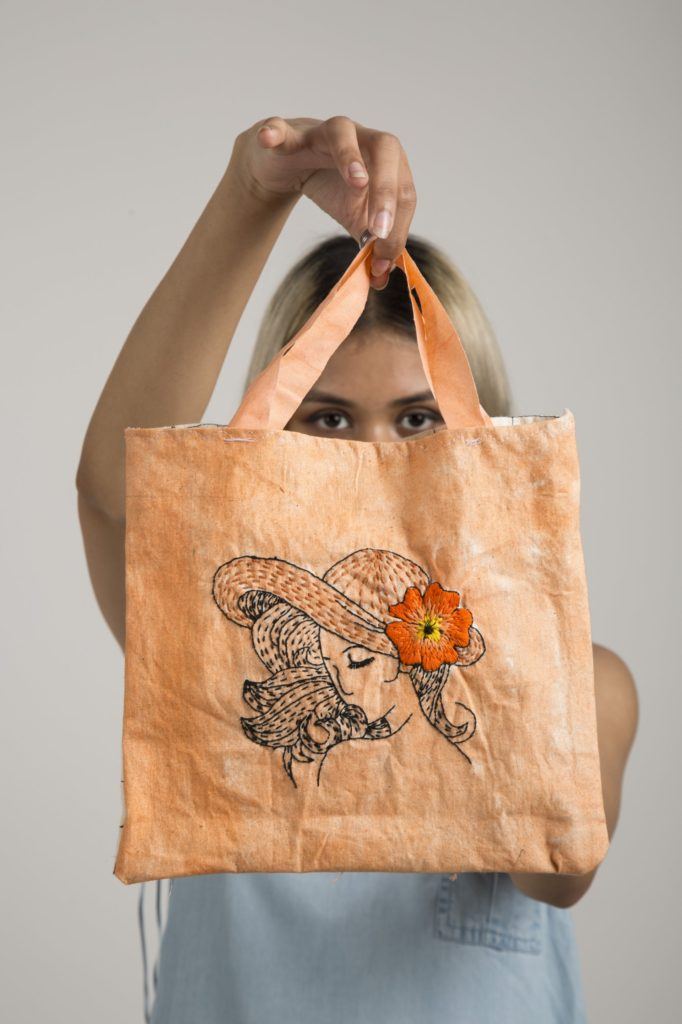
The world is finally starting to take decisive action around plastic bags. Some shops in some countries have banned plastic bags, with others offering bigger and better plastic bags, but at a price. While it's great to see some action, like always, it's better to be leading the charge with your own pro-active solutions. The simple act of bringing your own reusable bags to the shop is one of the best ways to reduce plastic pollution.
Plastic shopping bags are bad news. While they may be convenient, they're made from fossil fuels and often end up in the oceans or other waterways. The amount of oil needed to produce just 14 standard plastic bags could produce enough fuel for your van to travel an entire mile down the road to the next store across town. You just have to say "no, thank you, I'd like to use something else."
There are heaps of dedicated, reusable shopping bags you can purchase, but do you really need to? Anything will do, from old backpacks and gym bags through to oversized purses and pockets. Cardboard boxes are also a great option, as most supermarkets crush these up and dispose of them anyway. Some responsible shops have started putting them out the front for customers to use.
When you're lucky enough to live in a van, you probably don't need anything at all. Simply fill the trolley full of yummy food and put it directly into you van kitchen or storage unit. If you've got a bit of a walk back to the van and don't want to steal the trolley, it may be worth investing in some large and durable shopping bags to use time and time again.
2. Avoid disposable anything
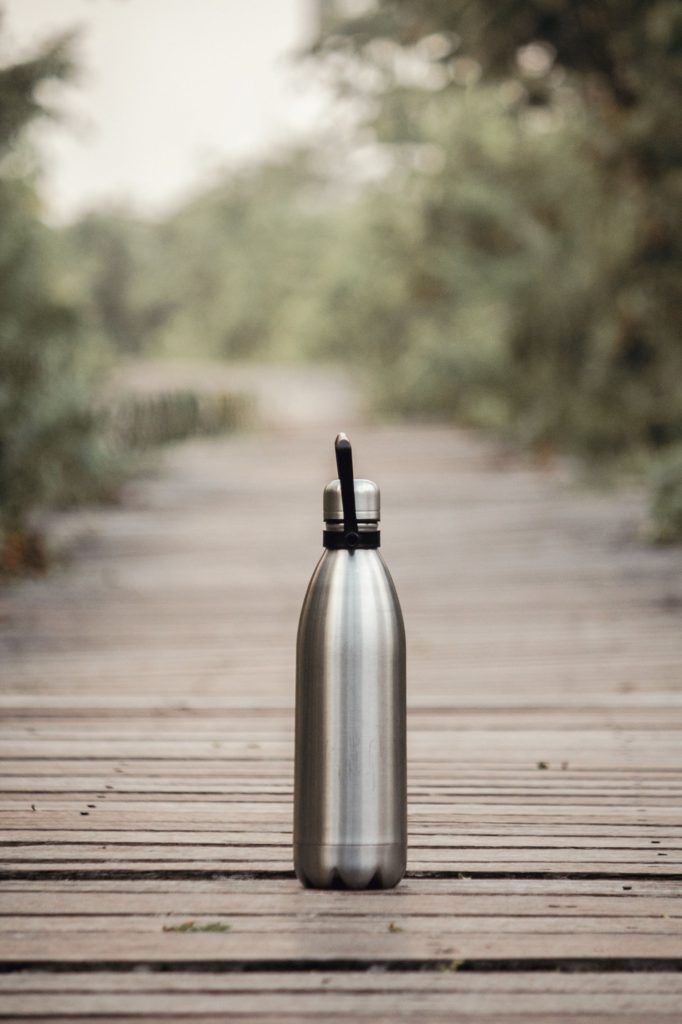
We live in a disposable society, with lightweight and throw-away packaging used for pretty much everything. The vast majority of this packaging is plastic and therefore not biodegradable. What's more, only a small percentage of this packaging finds its way to the recycling centre, and even then, a lot of energy is needed to transform it into yet more disposable packaging. While new habits can be very hard to make, the answer is simply saying "no".
There are lots of practical things you can do everyday to reduce the amount of packaging in your life. While your actions may seem insignificant, as consumers, we have much more power than we realise. By refusing some options and choosing more ethical alternatives, you're reducing sales for the offending company. While capitalism gets a bad rep, this is a great example of consumer action at work.
While they may be unaware and/or greedy, the vast majority of companies are not evil and will make positive changes to meet the needs of the market. The following small actions can make a difference, and some of them have already had an effect on the ground due to collective consumer pressure:
- Stop using plastic straws, and replace them with glass or stainless steel straws if needed.
- Reusable bags are essential, not just when you leave the store but also for produce and bulk items within the store.
- Choose cardboard boxes over plastic bottles, they normally work just as well and are completely biodegradable.
- Avoid packaging wherever possible by buying in bulk.
- Invest in your own reusable drinking bottle, it will become your new best friend.
- Invest in a reusable coffee cup and actually use it when you order at cafes.
- Say "no" to disposable cutlery and take your own.
- You can replace ziplock bags and tinfoil with beeswax wrappers and other organic solutions.
3. Buy in bulk when you can
More than a way to reduce your packaging, buying in bulk can improve your health and transform your life. While not always the case, there is often a link between heavily packaged and heavily processed foods, with plastic used to keep food fresh for longer. Reducing your plastic packaging is one of the best things you can do for your diet. While plastic can be beneficial in certain situations, you don't need it for absolutely everything.
Supermarkets are popular for good reason, but they're also incredibly wasteful. Limitless choices and low prices are just as appealing to travellers as they are to anyone else, just be careful what you buy. You don't need separate packaging for every single item, and you can bulk purchase lots of food staples to store in your own containers. Many supermarkets have a bulk food section, so you can choose between plastic packaging or no packaging.
From cereals and pasta to seeds and nuts, the best way to eliminate plastic waste and support the green economy is by shopping at your local bulk food store. There are more of these stores opening up all the time, with increased competition helping to drive prices lower. While many small towns still don't have their own bulk food store, you can think ahead and stock up when you're in large towns and cities. These stores price stock by weight, so you will need to weigh your containers before filling them up.
4. Recycling is good, upcycling is better
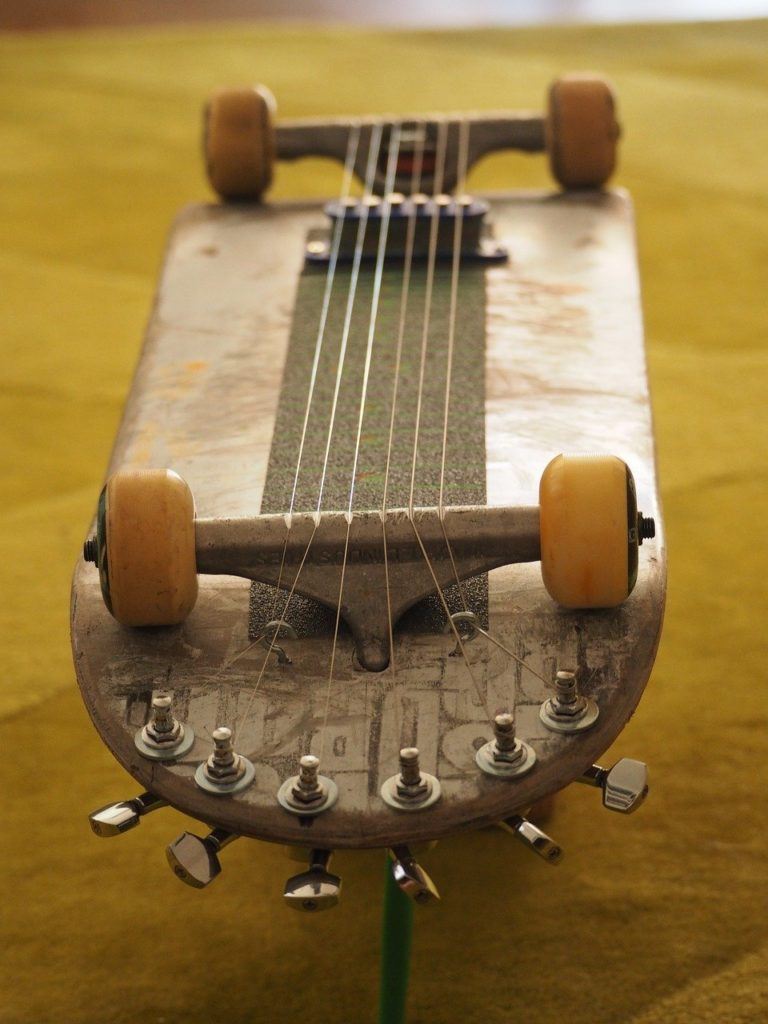
Recycling gets a lot of attention in the media, as everyday people try to have a positive impact on the world around them. While the growth of recycling is a very good thing, as mentioned above, it is the fifth and last piece of the sustainability puzzle. Along with reducing your waste from the outset, there are lots of ways to reuse materials before they hit the recycling bin. If you're keen to get creative, upcycling is the process of transforming unwanted stuff into new and useful things.
In order to understand upcycling, you need to understand downcycling first. As the other face of the recycling industry, downcycling is the process of converting materials into new materials with less intrinsic value or quality. If you think about it, that's exactly what recycling does, with useful materials extracted and converted into their base substance before energy is used to transform them into something new.
In contrast, upcycling is the creative act of adding value by reusing or re-imagining materials. While space is low when you're living the vanlife, making artistic and practical objects out of your waste can be incredibly rewarding. Old clothing is great for upcycling into new bags and storage solutions, old bank cards make great guitar picks, and you can make a great organiser box out of nothing more than an old shoe box and toilet roll tubes.
5. Go to specialist stores
Everyone goes to supermarkets, it's OK, you don't have to feel guilty. If you really want to reduce your waste and support the local economy, however, you should try branching out by visiting specialist stores. From butchers and green grocers to health food stores and bulk specialists, it's generally much easier to avoid packaging when you shop at smaller stores.
When you buy meat, fruits or vegetables from the supermarket, they're often packaged in plastic and styrofoam packaging. Not only is this totally pointless, it's also incredibly wasteful. In contrast, butchers and fruit & veg stores are more than happy to use paper packaging or put items directly into your own containers or bags. Specialist bakeries and confectionery stores can also help you avoid unwanted waste.
When you do visit the supermarket, like almost everyone does, go to the deli instead of the fridge section. Whenever you're buying cheese or cold meat, you have a direct choice between prepackaged goods and food straight from the case. While many delis will use plastic bags or wrapping, it's easy to ask for paper or provide your own packaging. Cleaning products also produce a lot of waste, with many bulk food stores allowing you to fill up cleaning liquids directly.
6. Make it instead
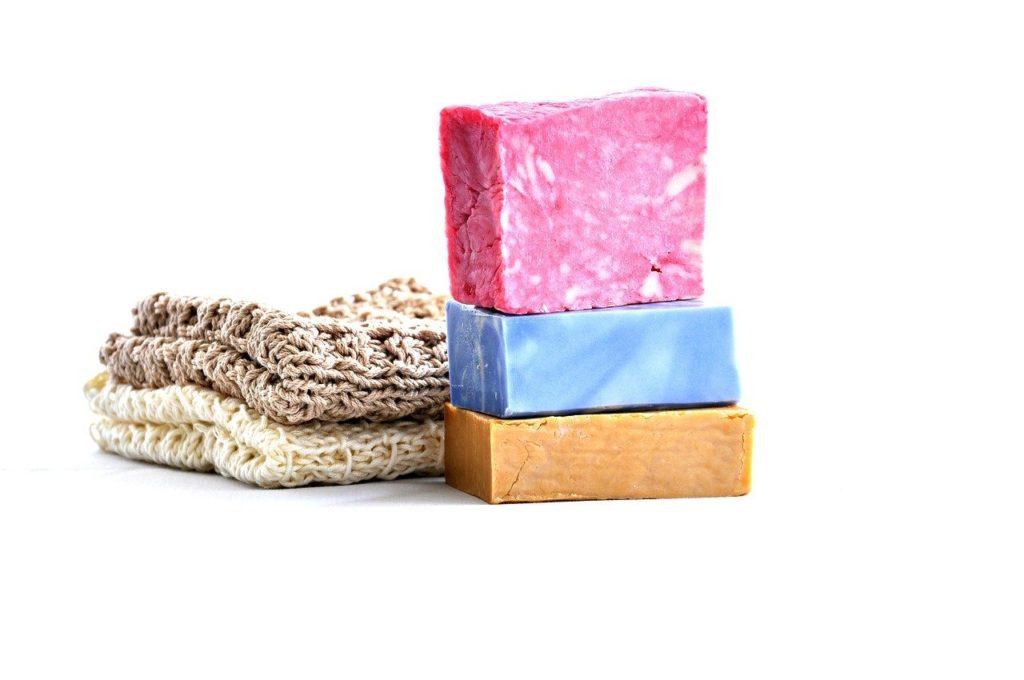
The ultimate way to reduce waste is to refuse to become a consumer in the first place. In what says a lot about our modern society, the act of consumption is not the same thing as being a consumer. While very few people seem to do it, making your own stuff is pretty much the most revolutionary act you can do. From cleaning and beauty products to food and clothing, the more you manage to avoid the stores the less waste you will produce and the less money you will be providing to wasteful industries.
Vanlife can be challenging when it comes to making stuff, with the sheer lack of space making some things difficult. More than your entire home, however, your humble van quickly becomes the centre of a much bigger home that also includes the great outdoors. Whether it's knitting under the stars, making your own toothpaste in the sunshine, or producing flower essences by moonlight, there are so many things you can produce that will enhance your life and eliminate your time walking down the aisles.
Making your own beauty and cleaning products will help you to avoid toxic materials, most of which end up in the drains and oceans. Many of the things you can make in and around your van feature similar ingredients, most of which are easily available and cheap to buy. Vinegar and baking soda are incredibly versatile, as is coconut oil, beeswax, shea butter, soap nuts, and essential oils. While your imagination is the limit, the following products can be easily made while you're on the road:
- Toothpaste
- Soap
- Hair shampoo and conditioner
- Skin cleaners
- Deodorants
- Window cleaning solution
- Van cleaning solution
7. Buy the big container if you must
Many of the ideas in this article are about reducing packaging, with refusal being the best way to ensure reduction. In the real world, however, it's almost impossible to avoid packaging altogether. While there are some eco-warriors out there who manage to live totally waste-free, this can be a challenging way of life when you're living in a van.
When you absolutely need to buy something in a plastic container, the best advice is to buy the biggest container you can. Purchase big family yogurt containers rather than individual six-packs, buy three litres of milk instead of one, and avoid anything where individual items have their own packaging. Even though vanlife is about minimising the essentials of life, somewhat paradoxically, large containers are the best way to reduce your environmental impact.
8. Change the way you eat
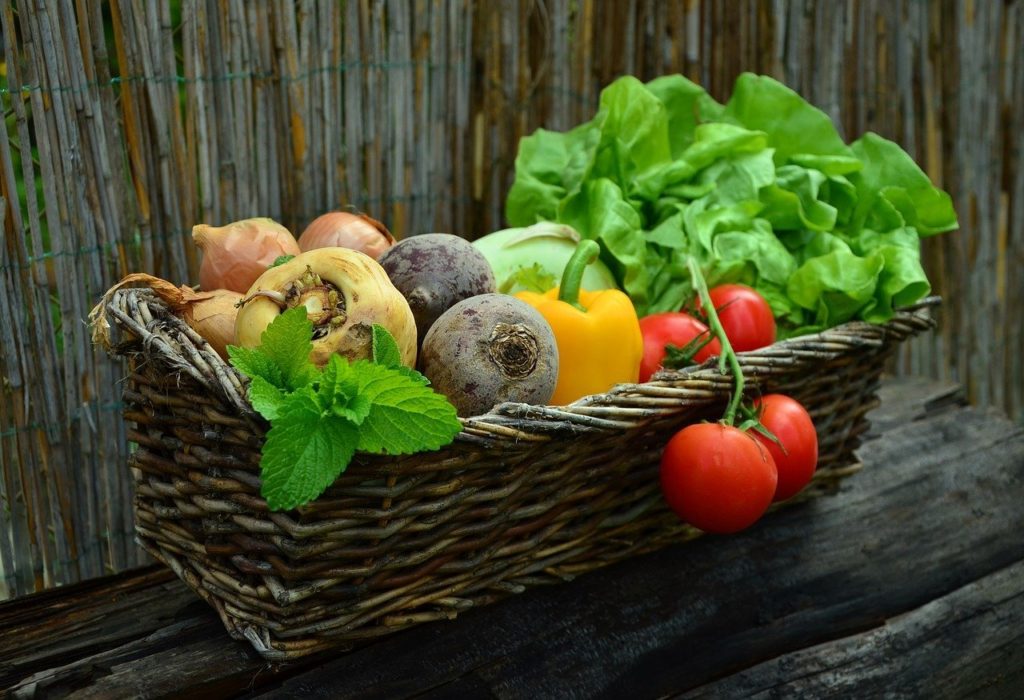
Along with changing how you shop, changing how you eat can have a profound effect on how much waste you generate. The deeper you get into this, the more you realise just how intertwined the health of the planet is with your own personal health and well-being. By shopping and eating in a sustainable way with an eye to waste reduction, you are much less likely to come into contact with processed foods.
As mentioned above, the very existence of plastic packaging, along with the inclusion of unhealthy preservatives, is often to increase the shelf life of processed foods. By saying "no" to packaging, you're automatically saying "no" to unnatural and unhealthy foods. If something needs plastic to help it survive for weeks or months under supermarket lights, do you really want to put it into your body?
Whether you're a carnivore, a vegetarian or a vegan, there are lots of ways to get food on your van table without generating waste along the way. Buy fresh often, take your own containers, prepare simple van-cooked meals with natural ingredients, and use innovative storage solutions that don't demand too much energy or packaging. While travelling with a battery-operated fridge can be great in hotter climates, it may not be necessary in colder weather.
9. Give it away
When you do have excess stuff, there are lots of ways to make sure it continues its lifecycle rather than hitting the landfill. Giving things away can be a great source of pleasure, especially if you don't need them and they're taking up valuable van space. While people living a low-impact vanlife are unlikely to have too many unwanted possessions, it's amazing how many things come and go as the weeks and months progress.
Whether it's cold weather clothes that don't match your new sun-chasing life philosophy, books you've read, or stuff you thought was a good idea but wasn't, many of your unwanted possessions could provide a benefit to people. Giving stuff directly to homeless people is a great solution, you may even make some new friends along the way. Op-shops and charities are also a good bet, as are local community centres and crisis centres.
Don't forget, the best things to give away are the most valuable. If you're not using something, you don't have to hang onto it just because it's worth a bit of money. Everything that isn't being used is essentially worth nothing. Giving things away is a great way to attract new things into your life, not just in a 'new-age feel good' kind of way, but also in a practical space-saving sense that only van-dwellers will understand.
10. Grow and compost
When you live in a house, you take things like growing food and composting for granted. When you live in a van, you often look back on your old garden and feel like you're missing out. Despite the lack of space, there are things you can do in a van to look after your green thumb and reduce waste along the way. While you're never going to grow a commercial size garden, you can easily grow some potted herbs and greens.
You'll need to put your plants near the windows and get them into full sun whenever you can. If you've got roof racks on your van, you may be able to make a cute little rooftop garden in pots secured to the vehicle. While growing a few herbs and leafy greens is unlikely to have a huge impact on the amount of waste you generate, it will help to improve your life by putting sustainability front and centre in your mind.
If you're buying healthy food from bulk stores and green grocers, you're going to be producing a lot of green waste. Composting can be a little trickier in a van, although it is certainly possible. Vermicomposting works well in small spaces, and if you've got a few pots on the go, you can add your lovely organic mix back to the soil. If this sounds like too much hard work when you're living in a small space, you can always add your old fruit & veg to someone else's compost bin.
Community gardens are a great resource, and most towns and cities have some kind of community garden where you can drop off your scraps and contribute to the next cycle of life. If you're struggling to find compost piles in your current neighbourhood, you can also download a cool little app called ShareWaste to connect with growers and their compost piles around the world. This service is a positive example of sharing and waste reduction in action.
11. Don't be lazy on the road
When you're at home or in a long-term camp, it's easy to follow good habits. You develop a daily routine, organise your daily consumption, and find local shops and resources where you can make responsible buying decisions. When you're on the road, however, sometimes all of that good stuff gets thrown out the window, hopefully not literally.
Putting in long hours behind the wheel can be tiring and stressful, with lots of people reverting back to old eating and waste disposal habits. Good food is almost impossible to find on the highway, and the entire environment just seems tailormade for mindless consumption. Indulging in fast food, buying caffeine drinks for energy, or snacking on processed food complete with plastic packaging; say no to all of this. Being on the road doesn't have to be an excuse for laziness.
If you want to buy fast food, seek out a chain or restaurant that follows good practices. While the fast food world is far from perfect, the days of styrofoam containers are mostly long gone and the situation is improving. Avoid plastic straws, refuse non-recyclable cups, and ask them to give you food in your own containers. Sure, they may look at you funny, but increasing numbers of people are starting to take this route.
If you want caffeine, choose coffee rather than coke, and use your own reusable coffee cup. If you want sweets for extra energy, find an old-fashioned confectionery store before you leave town and buy in bulk. They've got all of the best stuff anyway. Remember that it's easy to get lazy on the road when you're out of your regular routine, everyone does it from time to time. Instead of beating yourself up, however, you can develop new habits and enjoy those guilty pleasures in a positive new way.
12. The whole world is your home
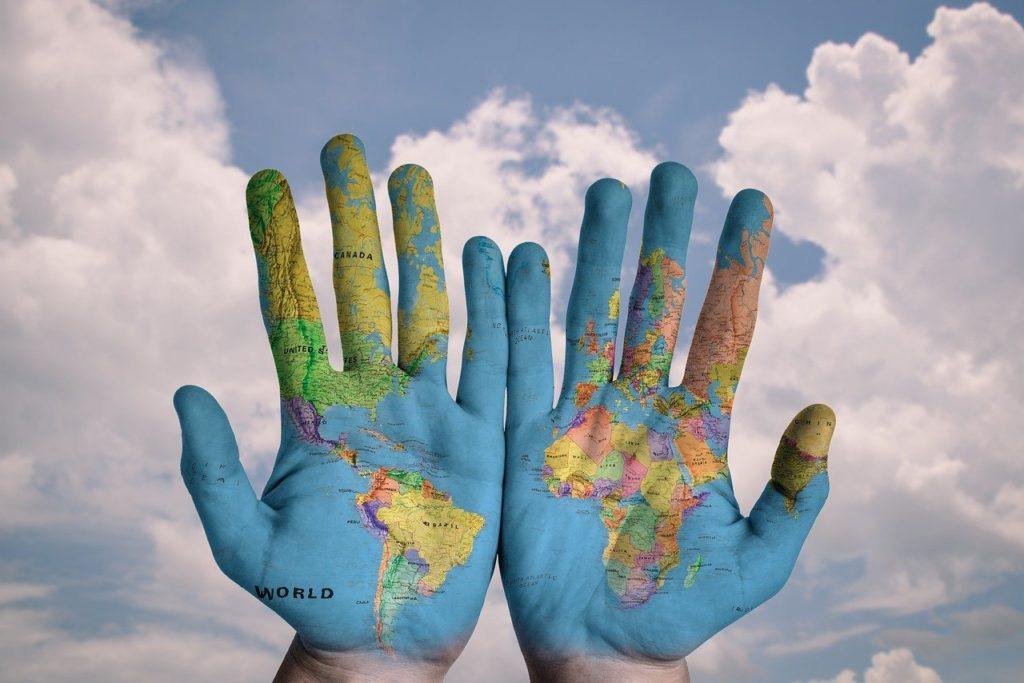
If you're lucky enough to be living your vanlife dream, it's important to live responsibly in every new place you call home. When you live in a house or apartment, your community is clearly defined. When you live in a van, the entire world becomes your home, which means you have a responsibility to look after it. Reducing your personal waste means dealing with it in a way that doesn't impact sensitive local environments and extra-sensitive local residents.
Whether you're a part-time traveller or a full-time nomad, people who live in their vans often get a bad rap from locals. Even though the vast majority of travellers are responsible, it only takes a few bad apples to leave a lasting negative impression. It's important to always leave your camp as clean as you found it. If you want to build up a little karma credit, you can even go the extra mile and leave it in a better state than you found it.
- Pick up all non-organic waste and take it with you to dispose of properly.
- Leave all organic waste buried or completely out of view.
- If you go to the toilet in wild places, bury it properly, including the paper.
- Don't use toxic detergents and deodorants in sensitive places.
Vanlife can be an absolute dream, but it takes a little work to transition to a waste-free lifestyle. The good news is that there's nowhere to hide. Living in your van puts everything front and centre, so you quickly become aware of how much waste your generating and what type of rubbish it is. This gives you a huge advantage over people who live in houses or apartments who are often unaware or in complete denial about their environmental impact.
Awareness is not enough in isolation, however. You also need to make positive moves to reduce your waste and live a sustainable new life. Like all good habits, it's best to start small and make improvements along the way. Once you do a few positive things, you'll feel great and have more energy to keep going.
When you look at the scale of the environmental problems facing the world, sometimes a personal approach to waste management seems like it's not enough. As a modern global citizen, however, making changes to how you live is the only responsible course of action left to take. Not only will you have a direct impact on your little world and everything in it, you will inspire others to take action as you move across the world living your dream.
Discover How To Use The Power of Authority Marketing To Make You Money While You Adventure!
No Experience, Existing Product Or Technical Skills Are Required
DO YOU BELIEVE ADVENTURES ARE WORTH CHASING?
